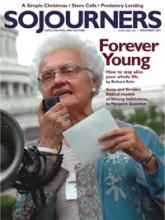The public discussion between evangelicals and progressives has been dominated by too many false choices and too much mutual misunderstanding. It is time to work for common ground on some of our most critical issues. There is a compelling vision we can address to the many Americans who are actually more “purple” than “red” or “blue.” What could evoke their convictions, reflect their values, summon their commitments, and change America? What would a broader and deeper moral politics or values politics begin to look like?
To ground that new politics, we need a better understanding of the role of faith in public life. Political appeals—even if rooted in religious convictions—must be argued on moral grounds, rather than as sectarian religious demands, so that the people, whether religious or not, may have the capacity to hear and respond. Religion must be disciplined by democracy and contribute to a better and more moral public discourse. Religious convictions must therefore be translated into moral arguments, which must win the political debate if they are to be implemented. Religious people don’t get their way just because they are religious (in a nation that is often claimed to be a Judeo-Christian country). They, like any other citizens, have to convince their fellow citizens that what they propose is best for the common good—for all of us and not just for the religious. Clearly, the work to be done includes teaching religious people how to make their appeals in moral language and secular people not to fear such appeals will lead to theocracy.
Read the Full Article
